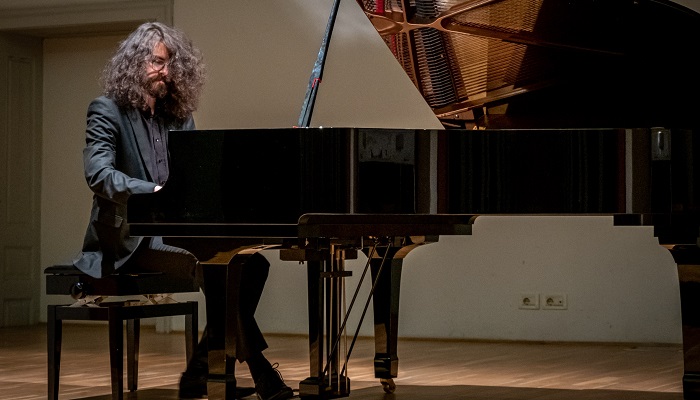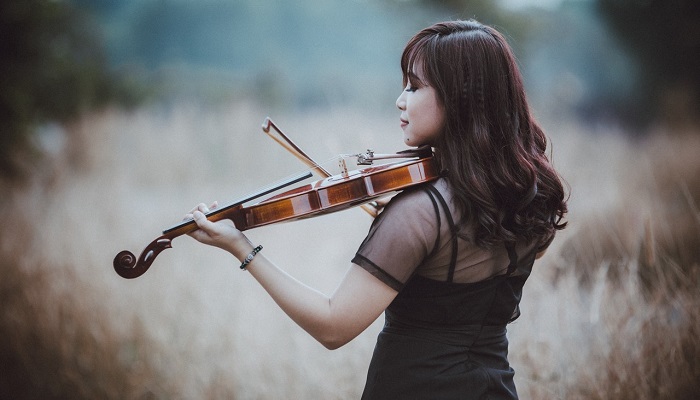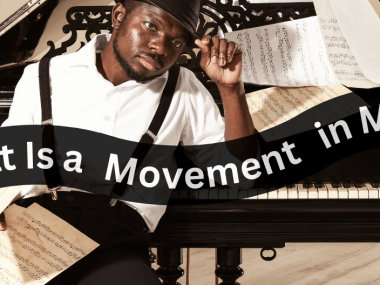There are tons of ways to categorize the types of music. One of the purest forms to specify music is through the intentions of the music.
In that case, music is split into two major types, which are absolute music and program music. So what is absolute music? And where does it come from?
In today’s article, I’ll walk you through a brief guide with everything you need to know about Absolute music, including its origin, musical critics’ debates regarding this type, and how you can identify it. So without further ado, let’s jump right in!
The Short Answer
Absolute music stands for any type of music, mostly instrumental, that is written for the sake of being “just music”.
In this type of music, the tones are the core structure of the art and all emotions triggered by the listeners are generated from experiencing the pure form of the music without any hints or subjects from the composer.
The Definition of Absolute Music
The academic definition of absolute music is that any piece of music that is composed or written with the intention to be “non representational”, meaning that it’s not made to be about something specific or used to evoke any extra-musical narrative.
This is opposite to program music, where music is intended to be about something, either generally or specifically. Now that you understand the “clinical definition” of both terms, let’s make this definition easier to digest!
Program music is basically any kind of music that is written to give you some sort of feeling or idea. This can be as simple as portraying a scenery, match the tone (especially as background music), or even tell a story on its own.
The reason behind this is that music is believed to be almost a language, as anyone can use music to express themselves in some way.
On the other hand, absolute music is composed without the intention of being descriptive, conveying any meaning, or having any specific purpose other than being played.
This is why absolute music is also known as “Abstract music”, as it’s simply written for the sake of being music and nothing more.
The Origin of Absolute Music

Now that you know more about absolute music’s definition, it’s time to find out more about its origin and history:
Absolute Music in Prehistoric Time
Humans have been playing music since the dawn of time, so there’s no clear origin of when humans started playing music with a certain subject or message in mind.
In fact, even music as simple as random whistles with no intentions other than making music could be counted as absolute music. For that reason, it’s easy to assume that the abstract form of music has existed even before program music.
On the other hand, tribal music and ceremonial music were played with specific purposes or subjects in mind, which led to creating the foundation of program music.
The Romantic Era
However, if we’re speaking about the concept of absolute music, then we should trace the origin of when musicians started classifying music into program and absolute.
During the romantic era in the 19th century, artists, and especially musicians, profoundly experimented with different types of art and tried to separate their products from traditions and physical ties with the world.
Although both painters and musicians broke the norm by creating abstract forms of their art, musicians were much more successful at doing so because music is an auditory form that didn’t need visuals.
At that time, the music heavily focused on capturing and conveying the composer’s emotions but could also be played without having a specific purpose in mind. This gave the listeners a chance to experience what you can call “music for the sake of being music”.
The idea of music abstraction was developed near the end of the 18th century, when authors of German Romanticism started experimenting with purely instrumental music, as opposed to theatrical forms like opera, such as Ludwig Tieck and Wilhelm Heinrich Wackenroder.
The term “absolute music” was coined and used for the first time by Richard Wagner in 1846. But surprisingly, he used it to express his disapproval of such music and to expose its limitations.
Absolute Music Schools of Thought

A lot of thinkers debated absolute music’s superiority over other forms of art. Here’s a quick look at ideologies that heavily backed absolute music.
Spiritualism
Spiritual absolutism is a philosophical idea that was developed by a ground of romantic thinkers and writers, which includes Johann G. Herder, Johann W. Goethe, Jean P. Richter, and E.T.A. Hoffmann.
In their writings, these german thinkers discussed the ideas and concepts of instrumental music and how it can be a “superior” form of art that can exceed language, and therefore, more emotionally powerful and romantic than novels and poetry.
Hoffmann made a popular review of Beethoven’s 5th Symphony, praising its ability to stimulate the listener’s feelings and emotions without needing a plot or obvious meaning.
Jean Richter even argued that abstract music would eventually “outlast” written words in its ability to trigger and move emotions.
Formalism
Formalism is another concept that is attributed to absolute music. In this respect, the meaning of the musical piece is completely determined by the music itself.
In other words, formalism advocates the idea of appreciating music for its own sake as well as its formal structure and tone rather than needing any extra-musical meaning.
Such concepts would go as far as rejecting any program element to be added to the music, such as poems, singing, or even opera.
Eduard Hanslick, a popular formalist critic, debates that instrumental and symphonic music is a purer form of music and shouldn’t require any extra elements to become a valid art.
Opposition to Absolute Music

As previously mentioned, although Richard Wagner was the first to use the term “absolute music” he was one of the biggest critics who opposed the idea of abstracting music.
Wagner believed that for an art form to reasonably exist, it needs to have a subject or a meaning.
Unlike spiritualists and formalists, he always debated that words are of a much higher value than music, no matter how sophisticated they can be.
He even used the choral finale of the 9th Symphony by Beethoven as proof of his argument, as he’s famously quoted to claim that when music can’t go any further, you eventually need the words to fill the gap, as the word will always stand higher than the tone.”
Can You Identify Absolute Music?
Absolute music will not have a hint for its abstract nature, as it only depends on its structure as a subject.
For that reason, any music that isn’t intended to trigger any emotion or convey any message is considered absolute music.
Ideally, a piece of absolute music will contain no story, picture, poet tones, subject, or theme. In other words, any music where the composer is not hinting or pointing towards anything other music is considered absolute.
Does Absolute Music Have No Meaning?
This has been a matter of debate that has been going since the development of absolute music in the late 1700s.
On one hand, there are many who believe that music is supposed to have spiritual meaning while others believe that music without a specific subject is an excellent way to enjoy music without distractions.
In my opinion, the fact that musical notes and instrumentals are abstract doesn’t necessarily translate to having no meaning.
Instead, it’s only meant to not have any meaning beyond the music that is being played itself, at least by the composer of the piece.
Program Music Often Perceived as Absolute

For example, when Antonio Vivaldi created the Four Seasons in 1725, he clearly meant to have a subject for his piece. Each sonnet was descriptive of a specific season.
However, a lot of people may not feel the correlation between the music and the designated season.
For those people, the Four Seasons, a clear example of program music that was intended to have a meaning, didn’t have one.
Absolute Music Often Perceived As Program
Another example of how relative absolute music can be is the “Symphony No. 6 in B Minor”, which is also called” the Pathetique Symphony” by Pyotr Ilyich Tchaikovsky.
Tchaikovsky led the first performance of the absolute music symphony just 9 days before his death.
Since there is a lot of speculations that Tchaikovsky actually committed suicide, it was suggested that the symphony was meant to mourn his death.
Unlike the previously mentioned example, a lot of people felt that there was a subject or program to the music despite not having any!
The Meaning is Subjective to the Listener
In fact, a listener may listen to a piece of absolute music and create some sort of a story or a “program” to it.
As you can see, the meaning in both examples was subjective to the listeners and the context in which they hear the music, whether the composer intended to have a program for their music or not.
Can Absolute Music Have Vocals in It?

Since absolute music is meant to have nothing more than music, any absolute music is supposed to be instrumental.
If you have vocals, this means that you have extra-musical elements, such as poet tones or songs, which counts as program music, as it almost always means something.
However, in the very rare cases where the human voice is meant for creating rhyming music without including any lyrical or contextual subject, it can count as absolute music.
Is Classical Music Considered Absolute?
This mainly depends on the premise of the symphony as well as the intentions of the composer. The fact that classical music is mostly instrumental doesn’t necessarily mean that it will always be absolute.
As you could notice, symphonic pieces like Vivaldi’s Four Seasons are considered program music despite being instrumental, simply because it had a subject theme.
Program Music Vs. Absolute Music
Program music is quite the opposite of what absolute music stands for. When a composer is writing a program musical piece, they’re having a specific idea, image, story, or theme in mind, which is derived from an element that is not within the music itself.
In most cases, a piece of program music will usually have an idea that the composer is conveying.
This idea might be expressed by the title itself or poetic tone. Not only that, a piece of music will be considered a program simply for having any understandable context or inspiration that doesn’t come from the music written itself.
Today, most music produced is program music, even if they’re instrumental because composers usually express their “extra-musical” inspiration while composing and performing.
Another reason why program music is more common than absolute music is that music is generated from the collective experiences and inspiration a writer comes across.
That’s why some may argue that all music, no matter how unattached to the physical world it is, is still program music in its essence.
Absolute Music Composer and Popular Examples

Now that you know more about programs and absolute music, it’s time to find out more about some absolute music examples and composers:
Absolute Music Composers
Despite their rarity nowadays, there are still tons of examples of absolute music, especially in Western classical music.
Surprisingly, some of the most popular names in the romantic era heavily backed this type of music.
Among the most popular that excelled in making absolute music are Ludwig van Beethoven, Johann Sebastian Bach, and Johannes Brahms.
In fact, these three composers have collectively contributed so much to the romantic absolute music era that they’re known among musical communities as the “Three B’s”.
Absolute Music Examples
Absolute music has dominated the classical music scene for over two hundred years. In fact, some of the major composers of the era almost have all their library of works made in the form of absolute music.
For example, the German composer Beethoven endorsed this kind of music so much that he didn’t even name his works. Instead, he used numbers as titles to his symphonies and concertos.
Similarly, Bach also composed a lot of absolute music pieces, such as “Brandenburg concerto”, and “Chromatic Fantasia & Fugue in D Minor”.







